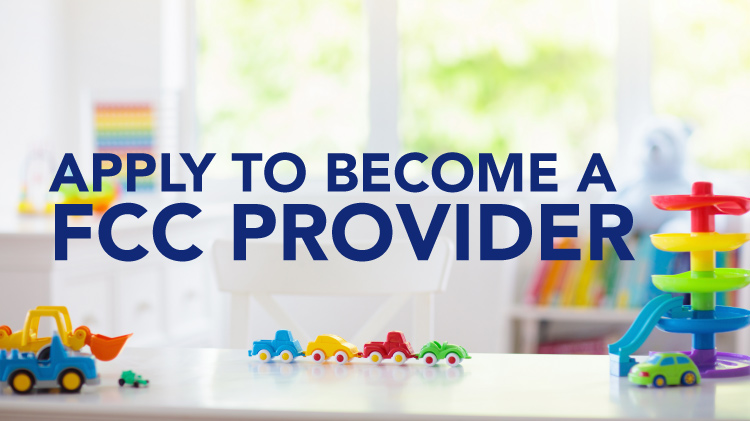- Create social experiences for your own children.
- Maintain a happy home-away-from-home atmosphere for children who can’t be with their own parents during the day.
- Choose a career that can move with you.
- Help Soldiers by providing quality, reliable child care.
- Earn an income while staying at home with your own children.
- Have a business and be your own boss.
- Learn more about the Family Child Care (FCC) Program
-
The Army FCC program is a child care option offered in homes on post by authorized military family members, retirees, and qualified civilians working as independent contractors.
Family Child Care has unique qualities that make it the preferred choice for many military and Department of Defense civilian families. FCC homes provide flexible hours and comfortable family settings. Most offer full-day, part-day, and hourly care. Special services may include 24-hour and long-term care during mobilization and training exercises, evening and weekend care, care for newborns, children with special needs, and those who are mildly ill. The FCC program, is an integral part of the larger Army CYS system.
The Perfect Career Choice
As a Family Child Care (FCC) Provider, you partner with the FCC staff to provide high-quality child care. Becoming part of the FCC system leads to a longlasting career and continuing opportunities for professional growth.
You’re helped to become successful through ongoing training opportunities. You have access to toys, equipment, and safety items from the FCC Toy Lending Resource Library. You’re mentored by staff members and other providers. You also receive monetary subsidies linked to the type of care you offer.
- Things to consider about becoming an FCC Provider
-
- Are you healthy, physically, and mentally?
- Are you calm and clear-headed in an emergency or crisis?
- Do you like children? Are you prepared to accommodate different personality types among those in your care? (For example: shy and hesitant, or high-spirited and active)
- Are you willing to follow regulations that don’t allow hitting, humiliating, frightening, or threatening children in your care?
- Are you financially able to purchase nutritional meals, arts and crafts materials, and other equipment? (The FCC Toy Lending Resource Library and Subsidy Program help, but there are out-of-pocket costs.)
- Are you willing to attend training sessions that help you learn new ways of thinking about children and working with them?
- We all face personal and family problems at one time or another, and working in your home may be a reminder of those problems. Can you put those troubles aside while caring for children?
- A provider works long hours. Young children may be a challenge, and very active when your energy is low. Can you manage your stress and find the energy you need?
- Some parents have different lifestyles from yours. Many times, you may not agree with the way certain parents behave or how they’re raising their children. Can you accept these parents for who they are without judging or trying to “fix” them?
- Can you care for children without wanting to “rescue” them from parents who are different than you?
- Sometimes parents are delayed by work – or just simply late in picking up their children. If this happens, can you juggle family responsibilities while still providing the same level of quality care?
- If your own child has “challenging” behaviors, bringing in play-mates may not solve the situation. In fact, it might be aggravated. So ask yourself – does your child have any behaviors that could affect or endanger the other children
under your care? - Parents depend on the FCC Provider to give their children quality care, and that’s a full-time job. Do you understand that adult interaction may be limited? Can you agree not to go shopping or visiting during the day?
- When you need a Substitute Provider, will you be able to find one? The FCC staff will help make the arrangements, but it is your responsibility to locate a qualified substitute.
- Sharing your idea with your spouse
-
You don’t live in your home alone, you share it with your family. Some families may have trouble sharing their space, possessions, time, energy, and resources. When that happens, they can become frustrated, angry, and say mean things to each other.
Remember, you’re thinking about opening your home to people who aren’t members of the family at all. There may be young children in your home that you’ve never seen before, as well as parents who come and go at inconvenient times. There will also be CYS staff and garrison agency representatives who visit from time to time with little or no notice.
It’s important that you and your family have a serious discussion about the pros and cons of sharing your home as a child care business.
Pick a time when you’re not likely to be interrupted that’s convenient for everyone. Take notes to capture concerns and help you be objective.
Here are some questions to consider when talking with your spouse.
- Why do I want to be an FCC Provider?
- In general, are we willing to share our home with children in my care? What spaces are you unwilling to share?
- Can our children graciously share me with others in my care?
- Do we agree that visitors to our home may have to be limited?
- Do we understand that there might have to be changes in the way we dress? That we might have to alter TV viewing and video game habits?
- Do we accept that children may be in our home during times when we’re off work and school is out?
- Do we agree that fi nancial contracts and discipline policies are strictly between the parents and me and that you should not get involved?
- Do you understand that some of my earned income will need to be applied to child care expenses? Do you accept that some upkeep expense may be necessary for additional wear and tear on furniture, carpets, and walls?
- Do we have any problems or grudges with neighbors that could lead to false complaints, or even false charges of child abuse?
- Will our pets be aff ected by this decision? If so, what can we do about it?
- Are we agreeable to undergoing thorough background clearance checks for us and any of our children over the age of 12 and other adults living in our home?
- Discussing the idea with your family
-
Since caring for children in your home requires the whole family to be on board with your new career, here are a few questions to discuss with them before committing to the FCC program.
- Child discipline in your household might be different than regulated requirements for a Family Child Care (FCC) home. For example, you may not use corporal punishment (spanking) on any child - even your own -while FCC children are in care. How your spouse and children react to new ways of thinking about child discipline could be a problem.
- Many injuries to young children happen when regularly used items like irons, kitchen utensils, or cleaning supplies, not to mention medicines and weapons, are placed within reach. The success of your new business partially depends on how careful your family is ensuring these items and others like them are secured from children.
- Members of a family probably have different levels of tolerance for noise, messes, crying, and interruptions. How your family may deal with extra stress is something you should consider.
- Adults, adolescents, and schoolage children other than family members won’t have free access to the house while you’re caring for children. Limited time with friends and neighbors could be a concern to everyone.
- Sometimes after school, in the evenings and on weekends, you’ll need help from family members. If they’re willing, great. If not, your own stress and fatigue could be a problem.
- If any members of your family sleep during the day because of work shifts or are chronically ill, these factors may have a big impact on your decision.
- Some family members may have difficulty handling requirements to rearrange furniture, add safety latches on doors, or find more secure places for articles regularly used in the bathroom and kitchen.
- In the privacy of their homes, many people dress casually, relaxing in bathrobes and slippers until late in the morning. If members of your family are this casual, they may frown on having to be “dressed” at all times during child care hours.
- You probably have some kind of daily routine for eating, doing chores, shopping, seeing friends – but providing child care will change all that. The new schedule may seem to favor children in care over family members. And if family members are reluctant to adapt, you might have a problem.
- Family members certainly want some parts of the home to be offlimits. At a minimum, children will need space for eating, sleeping, personal hygiene, and indoor and outdoor play. This means several rooms of your home must be made available for children. Can everyone agree they are willing to sacrifice family space for business space?
- Become a Substitute FCC Provider
-
If being a fulltime FCC provider does not fit your current circumstances, consider the option of becoming a substitute provider. Our main FCC providers sometimes have family obligations and vacation time when they need an approved substitute provider to step in and provide care. This is done at the main FCC provider's home.
Becoming a substitute provider is also an excellent way of seeing if fulltime FCC might be the right fit for you and your family.
- Steps to becoming an FCC Provider - CONTACT US
-
The Final Decision
After discussing your decision to become a FCC provider with your spouse and family, review the responses to your questions and concerns, noting what was said by whom. In the left-hand column, write down positive or clearly favorable points; in the right-hand column, record negative attitudes or problems raised. If a response was unclear, do your best to decide whether it’s mostly one way or the other and enter it in the appropriate column.
Now, look at the length of the columns. If “PROS” is longer, you’re on the right track. If “PROS” and “CONS” are about equal, you’ve made a good start but still have work to do. With either of these first two options, write suggestions for addressing the remaining “CONS.” If the “CONS” column is longer, changing your family’s attitudes and behavior will probably be too hard.
If you decide NOT to become an FCC Provider, the reasons may be only temporary, and you can consider the possibility again when circumstances change. You may also explore other options with the FCC Director, such as becoming a backup or substitute provider or seeking employment in a center-based program.
Learn about becoming an FCC provider and help provide quality childcare options for our community while building a career that travels with you.
 Learn about unauthorized childcare and the important reasons to choose to become a FCC provider.
Learn about unauthorized childcare and the important reasons to choose to become a FCC provider.




